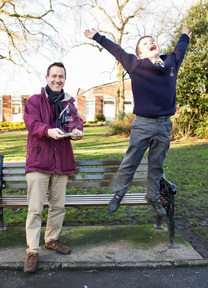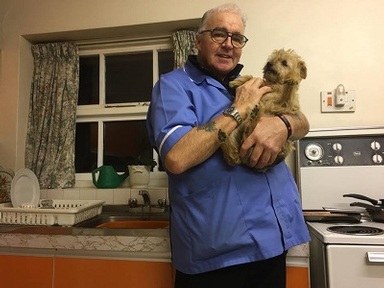Police urge families to use GPS trackers to keep people with dementia safe
Families are being urged by the Metropolitan Police Service to give relatives with dementia a GPS tracker so they can easily be found.

When a person with dementia gets lost, it causes anxiety and fear in both the missing person and their family. Finding them can also take up a lot of police time, which is why the Metropolitan Police Service (MPS) has launched its 'Safer Walking' campaign to promote GPS tracking technology to help families and support services in locating people with dementia.
Around a thousand people with dementia went missing in 2014-15, according to the UK Missing Persons Bureau. So to many, GPS trackers are an obvious solution. However in the past, talk of GPS trackers for people with dementia has led to the likes of the National Pensioners Convention calling the practice 'inhumane' and flouting their human rights.
Dr Hilda Hayo, chief executive officer and chief admiral nurse at Dementia UK believes the decision to use GPS technology should be based on the best interests of the person's safety, taking issues of privacy into account, and ideally having gained their consent.
She added: "GPS can be reassuring and empowering for a person with dementia. It can offer a sense of security and independence, thus reducing stress and anxiety for the person, as well as their carer."
Going out for walks has been shown to offer both physical and psychological benefits for people with dementia as well as enabling them to stay independent.
Jeremy Hughes, chief executive at Alzheimer's Society, which is backing the 'Safer Walking' campaign, along with Dementia UK and Age UK, said: "Going for a walk can be hugely beneficial for a person with dementia, helping them continue to live well in their local community, take exercise and get out and about to do things they enjoy - but it can also present challenges.
"As a person's dementia progresses, they may become more confused, which can lead to them getting lost or disorientated even in familiar surroundings. This often causes distress for the person with dementia and their carer, and means the police often have to get involved to help locate the person and get them home safely."
He added: "We are excited to have united with the Metropolitan Police Service to deliver practical solutions to help people with dementia stay safe. Technology that is tailored to individual needs can support people living with the condition to get out and about more safely, and allow them to live well in their communities for longer."
The small battery powered trackers use a combination of GPS (satellite) and GPRS (phone) signals to give an accurate location.
Chief Superintendent, Steve Wallace, is keen to emphasize that the use of safer walking technology is not a substitute for good care and the right level of support.
He said: "There must also be a balance between protecting your loved ones from potential harm, and not interfering with their human rights or rights to privacy.
“As well as offering peace of mind these products assist the police and other agencies to locate lost individuals. The use of this technology may also increase independence, allowing an individual more freedom, and reduce the need for more restrictive measures, such as locking doors."
Latest Innovative Care News
 13-May-19
'Pink drink' brain cancer treatment rolled out across NHS in memory of Baroness Jowell
13-May-19
'Pink drink' brain cancer treatment rolled out across NHS in memory of Baroness Jowell
 25-Apr-19
Louis Tomlinson helps 83-year-old who lost wife to dementia complete bucket list
25-Apr-19
Louis Tomlinson helps 83-year-old who lost wife to dementia complete bucket list
 05-Mar-19
Care worker of the year inspires nine-year-old son to work in care
05-Mar-19
Care worker of the year inspires nine-year-old son to work in care
 12-Feb-19
Michael McIntyre's jokes tested to see if they stop elderly catching flu
12-Feb-19
Michael McIntyre's jokes tested to see if they stop elderly catching flu
 25-Jan-19
Ninety-year-old and his dog can stay together, thanks to care worker
25-Jan-19
Ninety-year-old and his dog can stay together, thanks to care worker